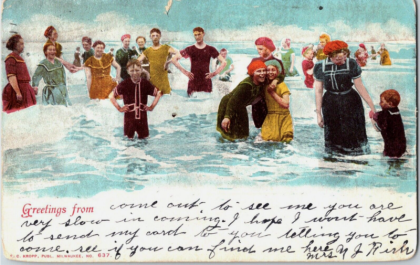f you have not yet heard of or are not educated in the Five Love Languages, let this be your PSA.
The concept of the five love languages is based on the book of the same title by Gary Chapman, PhD, who travels the world teaching people about marriage, family, and relationship dynamics. The book has sold over 12 million copies worldwide and has been translated into over 50 languages.
In the most simple of explanations, it is based on the theory that there are five different languages in which people are predisposed to receive love. It’s important to keep in mind that someone’s love language is determined by how they are apt to receive love in a way that feels most effective for them, i.e. a way that they truly can feel the love you are giving to them.
The most important thing to tune into here is that this is not about how much you love someone. It’s about which method of receiving love works best for them. It’s about learning the selfless act of effective giving.
For example, if Susan’s main love language is Words of Affirmation, but her partner Richard doesn’t share his appreciation for her in the form of words, verbal praise, compliments, etc. Susan is likely to often feel unseen or not cared for. From Richard’s perspective, he loves her so much, he’s always doing the dishes and making sure her car is working properly (Acts of Service). He doesn’t understand why she doesn’t feel appreciated. And on the other side of things, Susan is constantly telling Richard how smart and strong he is (Words of Affirmation), but it just seems to go in one ear and out the other. She feels like she is being so supportive and loving with her words, but on his end, she’s just talking. Conversely, what Richard would really love is for her to cook him dinner once a week (Acts of Service).
You see, the relationship “issue” here is not a lack of love. Our fictional characters Susan and Richard obviously love each other. It’s a lack of understanding how the other person is naturally predisposed to receive love. It’s kinda like giving a visual learner an audio file. It’s just not gonna work out that well. It’s all about how a person is naturally predisposed to take in information.
The solution is simple! If you really love someone and you want them to truly feel your love for them, focus on how they are most receptive to love, not how you want to give it. There’s no sense in spending all your savings on getting your lady an expensive handbag (Receiving Gifts) when what would really matter to her is you spending as much time with her as possible (Quality Time). And sometimes, a loving hug (Physical Touch) makes more of a difference to someone than telling them they’re smart or pretty (Words of Affirmation).
It’s important to remember that one love language is not better than the other. They are all wonderful. One is not more valuable or noble than the other. But knowing the one (or two) that will make your loved one truly feel loved will make all the difference.
One thing to be aware of and look out for—very often, we will naturally try to do our own love language with other people. This makes total sense, of course, and will also give you a clue about how you want to receive love yourself! If we like receiving gifts or hugs, we will naturally assume that’s what others would like to receive as well. And sometimes, that’s accurate and it makes it all quite easy. Sometimes, we’re way off and don’t understand why they don’t feel our love. These love languages are immensely helpful in resolving these misunderstandings.
Remember this whole concept of the Love Languages is actually a very selfless one in the sense that it is about tuning in to what the other person is most receptive to. So, if you really love someone and you really want them to feel loved by you, ask them how they most like to receive love. Chances are, they know. If not, you can always take this fun test together.
Here are the Five Love Languages below. Before you hop to conclusions about what you and your loved ones are, take the test! You might be surprised at your own answers! You can just do an internet search for “five love languages test” and several quizzes will pop up, and of course, you can do more in-depth research on this by reading Chapman’s book, The Five Love Languages.
Words of Affirmation
In simple terms, the words of affirmation love language is about expressing affection through spoken words, praise, or appreciation. When this is someone’s primary love language, they enjoy kind words and encouragement. They also enjoy uplifting quotes, love notes, and cute text messages. You can make this person’s day by complimenting them or pointing out what they do well.
Quality Time
Love and affection are expressed through this love language when someone gives someone else their undivided attention. This means putting down the cell phone and turning off the tablet, making eye contact and actively listening. People with this love language are looking for quality over quantity. So, when you get together, they feel loved if you are present and focused on them. Make sure that you make eye contact, affirm what the other person is saying, and refrain from offering advice.
Physical Touch
A person with this love language feels loved through physical affection. Aside from sex, those who have physical touch as their primary love language feel loved when their partner shows physical affection in some way like holding their hand, touching their arm, or giving them a massage at the end of the day. Additionally, their idea of a perfect date might include cuddling on the couch with a glass of wine and a good movie. They simply want to be close to their partners physically.
Acts of Service
When someone’s primary love language is acts of service, they feel loved and appreciated when people do nice things for them. Whether it’s helping with the dishes or putting gas in the car, little acts of service go straight to the person’s heart. They love when people do little things for them and often can be found doing little things for others.
Receiving Gifts
To a person whose love language is receiving gifts, gift-giving is symbolic of love and affection in their mind. They treasure not only the gift itself but also the time and effort the gift giver put into it. What’s more, they do not necessarily expect large or expensive gifts, the love language receiving gifts is more what is behind the gift that appeals to them. In other words, when you take the time to pick out a gift specifically for them, it communicates to them that you really know them. Additionally, people with this love language can often remember every little gift they have received from their loved ones because it makes such an impact on them.*Description of the love languages is from the website www.verywellmind.com.












